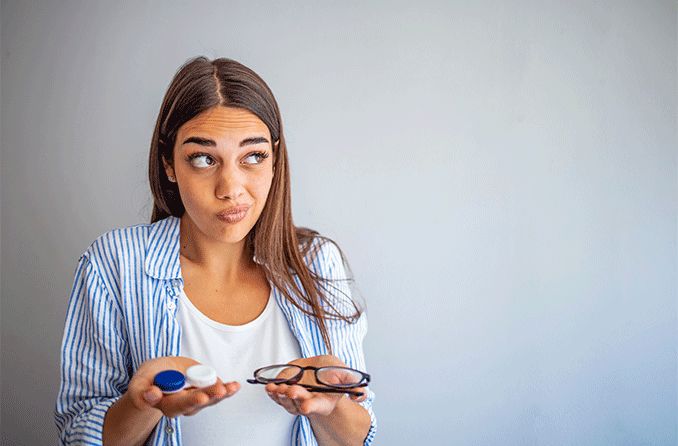Five ways for your teen to enjoy glasses and contact lenses

Help your child embrace their eyewear
It’s not uncommon for a child or teen to dislike glasses, whether the frames don’t fit correctly or they just don’t like the way they look wearing them. And if they’re too nervous to wear contact lenses instead of glasses, you may find yourself in a very frustrating situation as a parent.
If your teen has a refractive error — such as myopia (nearsightedness) and astigmatism — that prevents them from seeing clearly, it’s crucial for them to have proper vision correction.
Fortunately, there are several things you can do to encourage your child to happily wear their glasses and/or help them overcome their fear of contacts. Here are five things you can try if your child hates their glasses but is afraid of wearing contact lenses:
1. Get them excited about wearing glasses
Why does your teen hate their glasses in the first place? Sometimes listening to their complaints can help you both realize what they’re looking for in their frames, and what fit or features you need to find to make the next pair a better fit.
Another idea is to ask your teen about their favorite celebrities, actors and musicians who wear glasses. Accessories that resemble the people they look up to can make wearing them more exciting. Some celebrities even have their own designer eyewear lines that your teen could choose from.
2. Find frames that match their personality and style
It’s important for your teen’s glasses to reflect their sense of fashion as well as their lifestyle. Do they have a favorite pattern or color? Frames with floral prints or a bold shade can make wearing glasses much more fun and tailored to your teen’s interests.
If cost is a concern, consider shopping at online retailers with budget-friendly frames and lenses. Websites such as eyebuydirect.com have large selections at varying price points. Some online optical stores also have virtual try-ons, along with customer reviews and photos so you can get exactly what you’re looking for. Plus, online shopping often comes with special coupons and offers!
If your child is an athlete, glasses could be getting in the way of their playing sports. They may worry that their glasses will fall off, fog up or get damaged during a game. Not to mention a fear that direct contact with an elbow or ball could increase their chance for an eye injury. Consider trying sports glasses or goggles or getting impact-resistant polycarbonate or Trivex lenses in notably durable frames.
3. Make sure their glasses fit correctly
Does your teen hesitate to wear their glasses because their frames feel too big or too small for their face?
Ill-fitting frames can overpower a person’s facial features, going from cute and slightly oversized to slide forward down or even off your teen’s face. They can pinch their nose, temples and ears, leading to headaches and soreness. An optician can help you make the proper adjustments so your glasses will be more comfortable to wear.
SEE RELATED: How can I tell if my eyeglass frames fit?
4. Talk to an experienced contact lens wearer
You probably already know someone who has worn contact lenses for a long time. This person may have their own tips or tricks that can make the idea of wearing contacts less scary to your teen. They may have gone through the same thing! Have your teen speak with that friend about their fears and concerns and they just might be willing to try again.
Remind your teenager to ask questions about contact lenses at their next eye exam. Talking through their worries with their optometrist may also help ease their apprehension toward contacts. Reassure them that no question or worry is too silly to ask about!
5. Get contact lens training at your eye doctor’s office
Practice makes perfect — especially when it comes to contact lens wear. If your teen is interested in contacts but is afraid to do so much “work” in and around their eyes, ask if someone at your eye doctor’s office can teach them how to put contacts in and take them out. (Note: This type of training usually takes place during someone’s first contact lens exam and fitting.)
During a contact lens training session, your teen can work directly with a professional to learn how to insert, wear and remove their lenses correctly. This can make things less complicated and less scary when it comes to contact lens wear.
Before your next appointment
Encourage your teen to talk to their eye doctor and optician if they have any concerns, discomfort or other problems with their glasses or contact lenses. It’s important for your teen to be happy, healthy, confident and comfortable when it comes to their vision, and your eye care team is there to help however they can.
SEE RELATED: Contact lenses: A guide for first-time users
Eye health: Corrective lenses, glasses, and contacts. Center for Young Women’s Health. August 2020.
Page published on Tuesday, February 8, 2022






